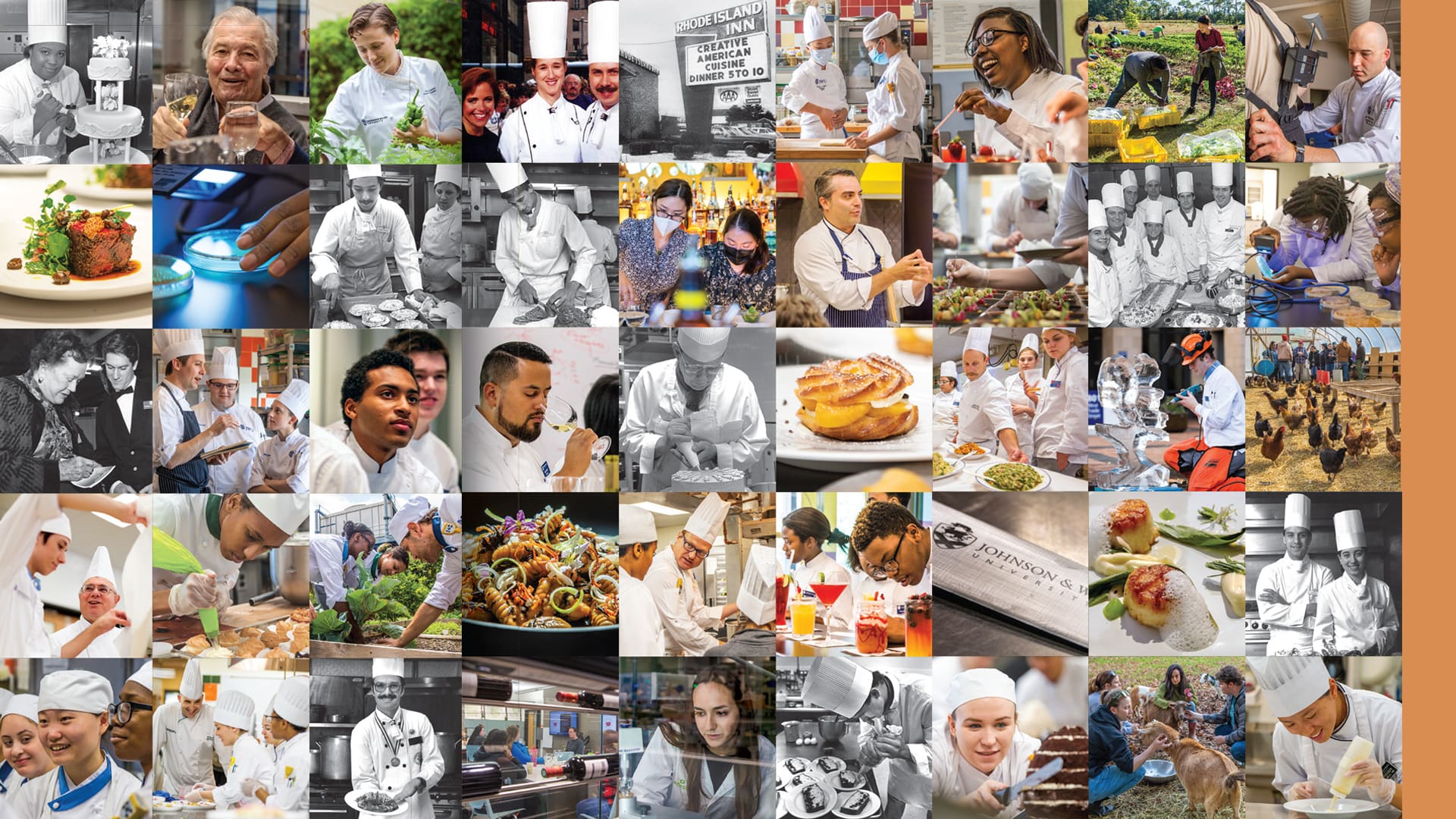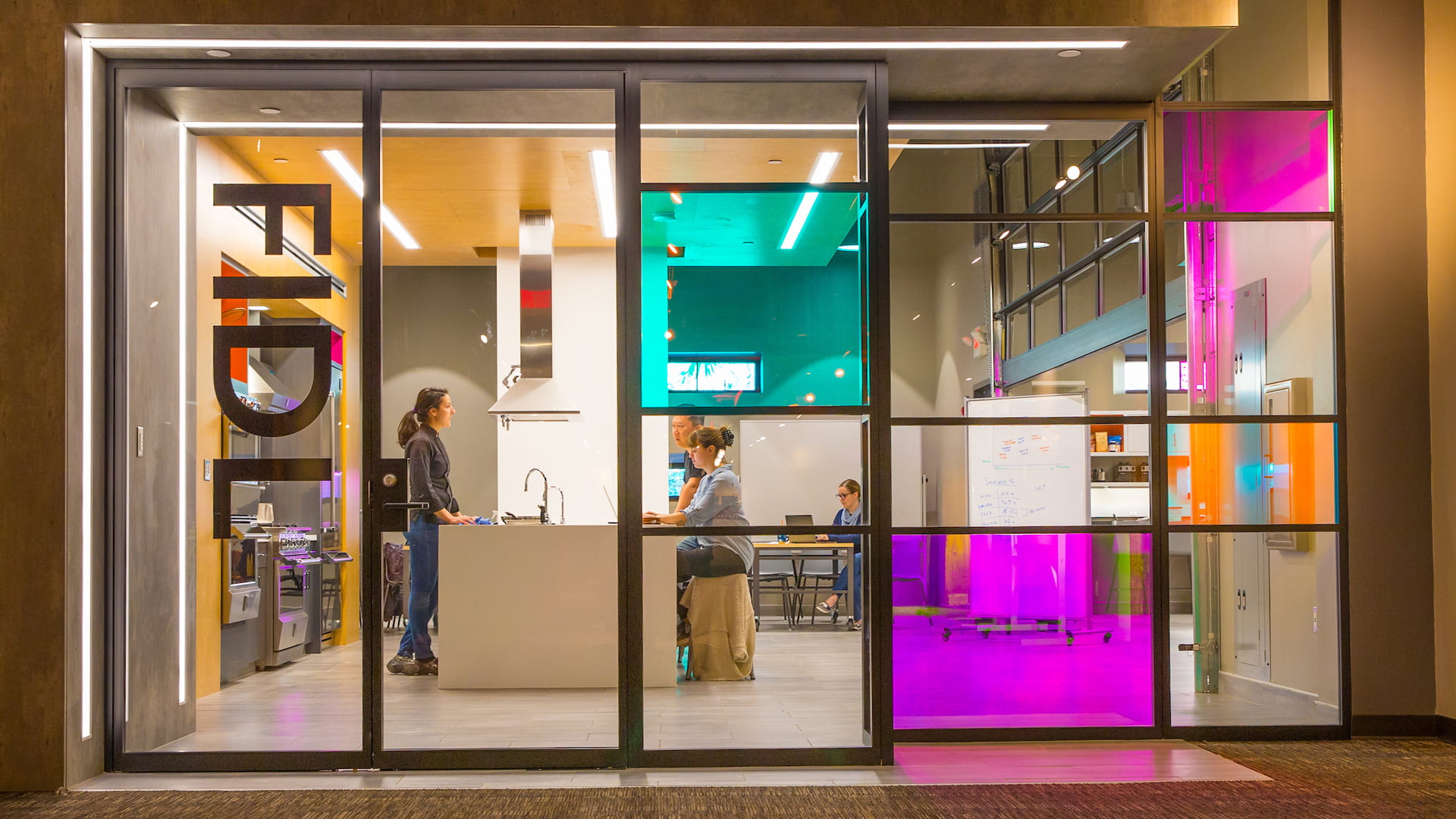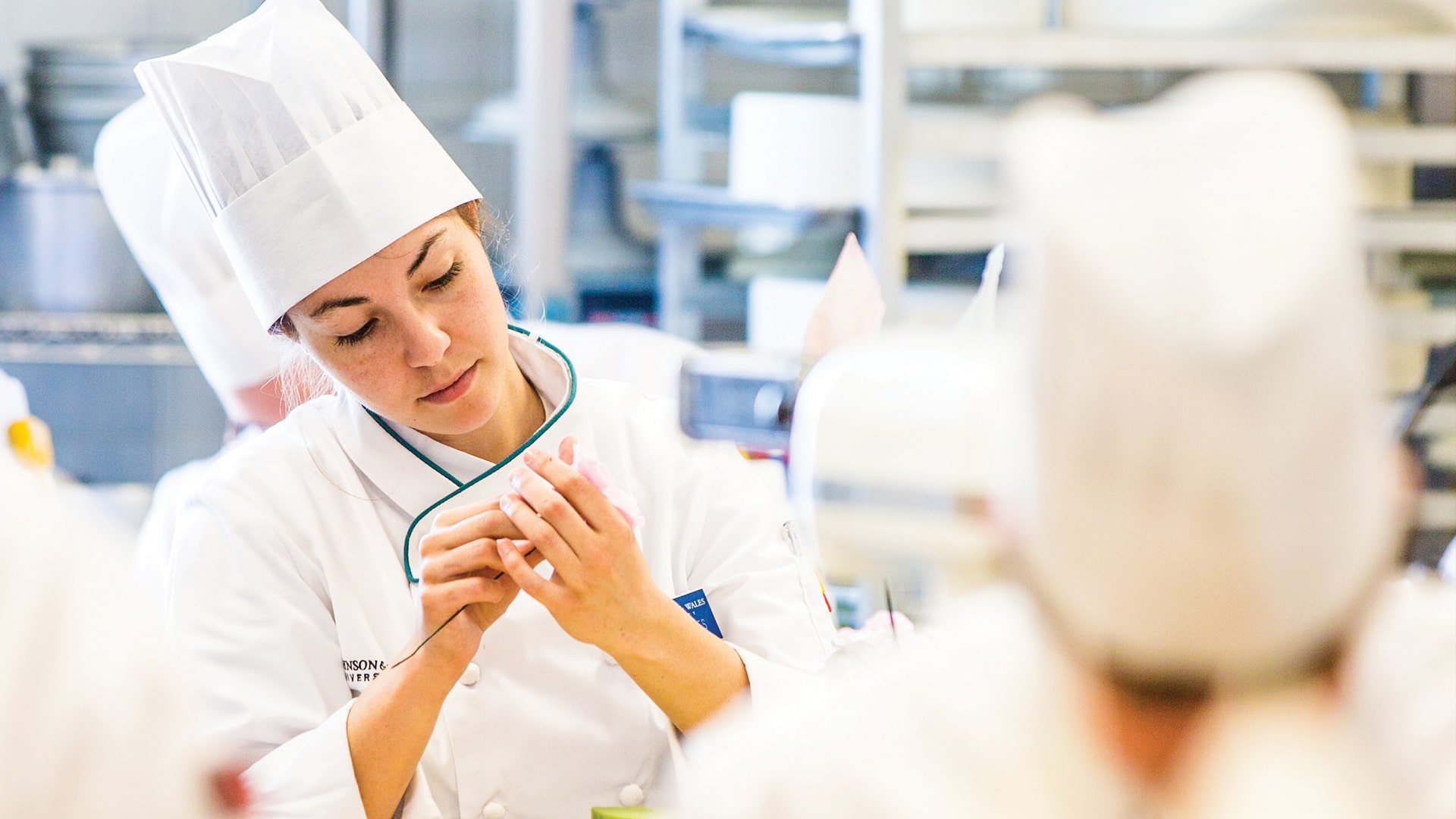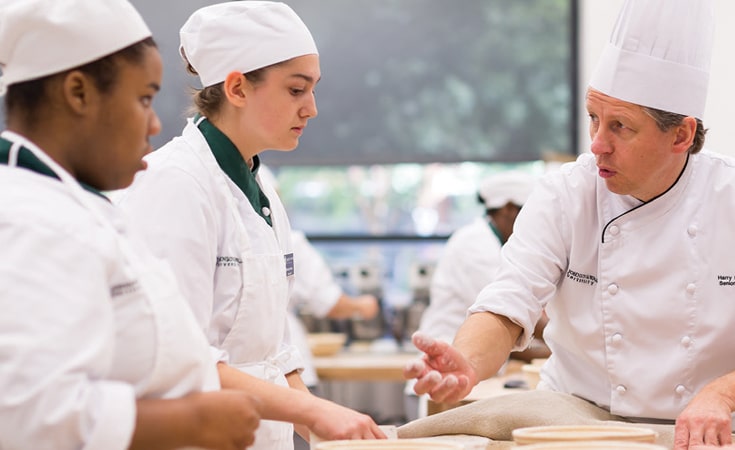JWU’s College of Food Innovation & Technology (CFIT) celebrates a golden anniversary as it looks to change the world with future-forward programs.
“After being freed from the concentration camp, I decided I was going to be a cook. I never wanted to be hungry again as long as I lived.” — Robert “Moshe” Nograd ’99 Hon.
Nograd was the kind of teacher who inspired “Yes, chef” devotion. The late culinary dean emeritus was a survivor of Auschwitz who understood — more than most — that nourishment is literal and metaphorical.
As the College of Food Innovation & Technology (CFIT) celebrates its 50th anniversary this year, Nograd, who was appointed dean in 1987, would be proud of its evolution as an institution dedicated to sustaining the world through food.
One of Moshe’s proteges from the '70s is former associate professor Linda Kender '76, '97 M.A.T., who retired in 2020. She recalls the early days in a “Culinary School Stories” podcast hosted by former North Miami Campus Culinary Chair Colin Roche, Ph.D. “When I enrolled in 1974, there were maybe a dozen females in the entire school and the only female chef around was Julia Child,” says Kender. “The first thing Culinary Director Franz Lamoine said was, ‘You’re welcome to come to school here but there’s no such thing as a female chef.’”
“We didn’t really have textbooks then, they were more like pamphlets,” Kender adds. “The culinary labs actually fed the students; when kitchens ran out of food your table was stuck with chicken liver omelets! Chef [Edward] Flattery taught garde manger and everyone feared him,” says Kender. “If you didn’t learn your recipes you were out. He would line us up like soldiers and each student had to recite the recipe for chicken galantine: ‘Okay, you go, first three ingredients, okay you, next three.’ It was learning by intimidation.”
While that teaching method may be extinct, lab rules remain strict — a rehearsal for back-of-the-house pressure cookers. “If you miss more than one class, you’re done and have to take the class over again,” Jorge de la Torre, a culinary dean of the Denver Campus for nearly two decades, told Westword Magazine. “We don’t allow any body piercings or facial hair, with the exception of a mustache; no makeup or jewelry; and uniforms have to be perfectly ironed. We try to teach people that there are no excuses — that you have to come to class prepared and have your mise en place. We teach, but don’t coddle, and we hold very high standards … I tell my students that the restaurant is about the only place where you let a perfect stranger give you something to put in your mouth — and those customers are fully trusting that you’re clean, sanitary and ethical.”
The kitchen symphony requires precise teamwork — camaraderie that fosters a unique student-mentor bond. “I used to ask my students, ‘What was the best advice you ever received?’” Kender recalls.
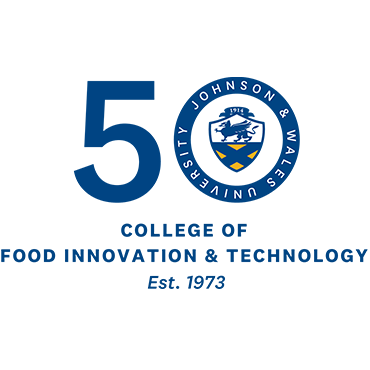 “For me it was ‘Shut up and show me.’ The best advice I gave? Find a mentor. I found mine in Moshe Nograd. We spoke every morning until he became dean emeritus. After he left, Moshe would still call me up and say, ‘Linda, give me the advice du jour.’”
“For me it was ‘Shut up and show me.’ The best advice I gave? Find a mentor. I found mine in Moshe Nograd. We spoke every morning until he became dean emeritus. After he left, Moshe would still call me up and say, ‘Linda, give me the advice du jour.’”
Kender’s food safety expertise was in demand when restaurants were shuttered by COVID-19 restrictions — and CFIT’s interdisciplinary pedagogy was an advantage. Legal compliance, cost control, negotiation and risk management proved critical for chefs and restaurateurs as they jockeyed for relief funds, volleyed with landlords and implemented stringent food safety protocols.
The pandemic also highlighted nutrition’s role in disease management and prevention — and the dire need to address food insecurity. It is no coincidence that last fall the White House hosted its first Conference on Hunger, Nutrition and Health in 50 years, celebrating a food-focused policy platform designed to change the way that people eat.
“We teach, but don’t coddle, and we hold very high standards.”
“Food is a practical tool to make the world better,” says CFIT Dean Jason Evans, Ph.D. “If you change the way food makes its way through the system from start to finish, you really can change the world.”
Agents of Change
Evans continues to expand the depth and breadth of CFIT’s interdisciplinary programming, which spans Johnson & Wales’ seven colleges. Arts & Sciences, for example, offers such courses as Food Writing and the Politics of Food, Human Security & Social Justice. Combined with CFIT’s forward-looking specialties such as Culinary Sustainability, graduates are prepped for culinary adjacent roles beyond a restaurant kitchen. They might manage food supply chains, draft public health regulations, create plant-based cuisine products or found a cooking school to stem food insecurity.
“This kind of work on real-world issues distinguishes CFIT from other schools,” says Assistant Dean of Culinary Relations & Special Projects Thomas J. Delle Donne, '04, '07 M.A.T. “We give them the research and the tools to really think on their feet, to be problem solvers and change agents.”
“Our students come in with this genuine belief that they can save the world,” says Associate Professor Branden Lewis, Ed.D., '04, '06 MBA. “They feel like the planet is broken and they can fix it.”
Lewis spearheaded the Sustainable Food Systems bachelor’s degree, which expanded on the Wellness & Sustainability concentration added in 2011. It is designed to prepare students to understand the social and moral implications of our food systems. In one of the major’s core courses, Sustainability and the Culinary Kitchen, students tour farms and board fishing vessels to learn the role of community and purveyor partnerships.
Our students come in with this genuine belief that they can save the world. They feel like the planet is broken and they can fix it.ASSOCIATE PROFESSOR BRANDEN LEWIS, ED.D., '04, '06 MBA
Food as Medicine
CFIT continues to buttress programming around degrees in Culinary Nutrition, Dietetics and Applied Nutrition, and Culinary Science, which rolled out in 2016-17. Food as medicine programs off er doctors-intraining opportunities to learn about food’s health benefits alongside culinary students. JWU hosts Tulane University medical students for a month, while the Nutrition Club works with aspiring physicians from Brown University.
“I want to ensure that food and health connection is also apparent in K–12 and students have experience in institutional dining — the pillar where lifelong dining habits are built,” says Evans. “We’re connecting students to opportunities with nonprofi ts like Brigaid, which works with school districts to fundamentally change what students eat.”
This holistic approach is symbiotic with the College of Health & Wellness (COHW), which infuses programs with a culinary flavor. “JWU can appeal to anyone interested in the nexus between food and nutrition,” says Evans. A Performance Cuisine class, for example, embodies that duality: Students employ their knowledge of nutrition, biochemistry, anatomy and physiology to develop individual assessments and menus for different types of athletes.
In COHW’s new Exercise and Sports Science Lab, student and faculty clinicians and dietitians utilize data to individualize fi tness, therapy and nutrition plans for injury prevention, maximum recovery and performance, while researchers can tailor their discoveries to the fields of health and wellness.
The Next Half-Century
“Technical skill building is still essential to our model,” says Evans. “As a comprehensive university, JWU has the flexibility to support that training with our interdisciplinary approach. Our labs incorporate richer stories around the ingredients and their historical and anthropological culture. A big priority moving toward our next 50 years is increasing opportunities students have after graduation,” he adds.
Some will go into traditional cooking, but CFIT is also evolving into policy and food management. For example, a degree partnership with the Roger Williams University School of Law speaks to food systems in law and policy. Culinary Sustainability, meanwhile, concerns big picture concepts such as how the food system functions and the implications for ecology and community. Entrepreneurship opportunities since the pandemic have multiplied and become more accessible, from food trucks to cloud kitchens and food distribution channels. CFIT’s Ecolab Center engenders full-scale product development, including the regulatory approval process. Competitions and projects offer safe spaces for students to build an entrepreneurial skill set.
“They are honing and launching skills that go far beyond what students might get in traditional labs or classrooms,” says Evans. “It’s a safe space to take risks — and to fail. What we’re doing and will continue to do is in recognition of the nobility of food, with broad programming plus rich content and context to spark new interest in food as a lifelong career.” JWU
Reality Bites
Back-of-the-house, sharp knives are at play, orders pile at a staccato pace and burning is learning. While some industry members blame staffing shortages on a trend of people motivated by fame rather than a passion for cooking, JWU alumni and faculty agree there is little room for attitude — or Kardashian egos — when collaboration is critical.
“I grew up watching Julia Child,” Emeril Lagasse '78, '90 Hon., told Eater. “When I was approached to be on the Food Network it was like a dream. Okay, there’s going to be a network about cooking and shopping and wine, 24 hours a day? Come on, that’s, like, impossible.”
The programs jettisoned Lagasse and others into household names; however, fame was a byproduct, not the kite they chased. “I’m involved in a lot of aspects of culinary education, from college to high school,” he adds. “I want to be with people who want to be in the business — not so much to be on TV or have their face on a box. This is a crazy business, not a 9-5 job. When people come to work with us, it’s like, ‘Look, if you want to be famous, then you’re in the wrong place. If you want to learn how to cook or be a restaurateur, then you’re in the right place.’ I can teach really anybody how to cook if they have the passion and desire to learn. If they have that, then it’s much easier for me to teach them than pulling them up the mountain.”
Fit for a Queen City
It was a win-win. In 2001, the city of Charlotte was eager to revitalize an uptown neighborhood and boost its economy. At the time, JWU operated campuses in Charleston, South Carolina, and Norfolk, Virginia, to train hospitality staff for cruise ships and U.S. Navy vessels visiting those ports. Both campuses required costly infrastructure work, and JWU was searching for land near Charleston’s waterfront to expand the campus. It was then that a Bank of America executive made a play to woo JWU to Charlotte.
Then-JWU President Jack Yena met with representatives from Charlotte, the state of North Carolina, Bank of America (BOA), and Compass Group, among others. They made Yena “an offer he couldn’t refuse,” recalls Jerry Lanuzza '91, dean of the culinary program at JWU Charlotte. The offer included a deal on land in a BOA uptown development and hotel ownership. By 2004, the campus was ready to launch and JWU later shuttered its Charleston and Norfolk campuses.
Lanuzza, who has worked for JWU since 1994, was part of the opening team and its first culinary department chair: “When we’re out to eat and people learn we work for Johnson & Wales they’ll say, ‘You guys have had such an impact on the city!’ My standard answer is ‘You’re welcome!’”
“I don’t have chef instructors, I have professors who used to be chefs. There is a difference.”
Charlotte, ranked the eighth fastest growing city in the country, is skewing younger. “Many graduates stay in the city,” he says. “The ones from 10 years ago are now executive chefs and restaurant owners so their impact is really being felt.” Local palates have become more daring as dining options have grown from chain restaurants and steakhouses catering to the business crowd to more independently-owned restaurants offering modern cuisine based on local ingredients. And the transformation transcends restaurant walls: Faculty are members of Piedmont Culinary Guild, which unites culinary operators and farmers, and Optimist Food Hall boasts a culinary incubator plus many alumni-helmed small restaurants. Even NASCAR fans are more discerning about how they refuel.
Culinary Nutrition and Applied Food Science specialties (plus culinary electives available to entrepreneurship students) have fostered partnerships with the North Carolina Research Campus and the NC Food Innovation Lab. Students teach Sanger Heart Institute patients how to modify recipes to make them heart-healthy; they create videos and lead demos for a nutrition program on the economic value of healthy eating and how to stretch one ingredient for multiple meals. JWU also co-sponsors the city’s BayHaven Food and Wine Festival, which “celebrates African-American foodways and the industry makers who make them possible.”
The campus has expanded to offer more than 20 bachelor degree programs, from accounting to psychology. According to Lanuzza, Charlotte’s state-of-the-art facilities, curricula and faculty offer a distinctive education: “I don’t have chef instructors, I have professors who used to be chefs,” he explains. “There is a difference. We invest in making them better teachers and developing curriculum scaffolding and sequencing.”
Bears & Blizzards
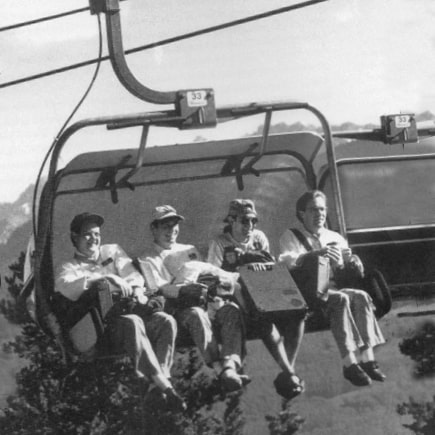 Strolling yearbook lane — with black and whites of the days when ice sculpture was sport and gelatin molds were art — makes us wish we were there: hunkering in the dorms and heating bathwater in cooking pots during the Blizzard of ’78; road tripping to D.C. to provide food service for President Reagan’s inauguration; and elevated fun at the Vail Campus in Colorado.
Strolling yearbook lane — with black and whites of the days when ice sculpture was sport and gelatin molds were art — makes us wish we were there: hunkering in the dorms and heating bathwater in cooking pots during the Blizzard of ’78; road tripping to D.C. to provide food service for President Reagan’s inauguration; and elevated fun at the Vail Campus in Colorado.
The “Garnish Your Degree” program, offered in the ’90s, was an accelerated associate degree program in culinary arts for college graduates. With campus at 8,150-feet altitude, students commuted via chairlift to kitchens atop Vail Mountain. If they missed the last chairlift of the day after “scholastic” wine tastings, classmates might have to be snowmobiled back to base.
Jenna Johansen '98 recalls watching a family of bears traverse the grass slopes below as students ascended the lift to class.
That afternoon a thunderstorm pelted the mountain, forcing the lifts to close. Forty students, certain they would meet bears, hustled down the mountain on foot, “wet boxes of cake in hand, chef coats on, soaked from head to toe in freezing Vail rain, and headed straight to our restaurant jobs.” JWU
